Elements of this interview have been edited to protect the innocent.
The tabletop industry is a pretty insular space. Even today, as the playerbase for tabletop RPGs continues to diversify during this seeming boom period, there’s a perception (which some would say matches reality) that the people making the RPG’s are as straight, white, and male as ever. But that is rapidly changing, and one of the most prominent designers to buck the stereotypes is Crystal Frasier, a pink-haired ex-bouncer who has worked at companies like Paizo (where she’s worked on both Pathfinder and Starfinder), Onyx Path, Kobold Press, and most recently Green Ronin Publishing, where she’s the lead developer on their Mutants & Masterminds line of superhero RPG’s. She recently released an adventure for the game, “The Reign of Cats & Dogs,” and today marks the release of the Time Traveler’s Codex, a new supplement that adds rules for time travel as well as brand new powers, equipment, villain archetypes, and more.
We recently spoke with Crystal about her work with Mutants & Masterminds, how she got into tabletop, and having the “most famous vagina in gaming.”
Dan Arndt: How did you get into RPGs? How did you get into tabletop gaming, and then how did you get into writing them?
Crystal Frasier: Well, I got into tabletop gaming originally because I was a very sad, reclusive child, like raised out in the Florida swamps. And I just had a very active imagination and I just consumed media, like comics, books, TV, movies, everything I could because I didn’t have a lot of friends and I had a lot of free time. I would pick up schoolwork fast, so that didn’t keep me busy.
And I had a deep and long obsession with the Teenage Mutant Ninja Turtles, and so read the comics, watched the show, played the video games. Leafing through a catalog one day, I discovered there was a Teenage Mutant Ninja Turtles game that wasn’t a video game. I thought, “Oh, it must be some kind of board game. I don’t understand, but I’m ordering it. It’s only $12,” so six to eight weeks later, that shows up in the mail and it’s the Palladium Books Teenage Mutant Ninja Turtles and Other Strangeness book, and it comes with a company catalog and all that.
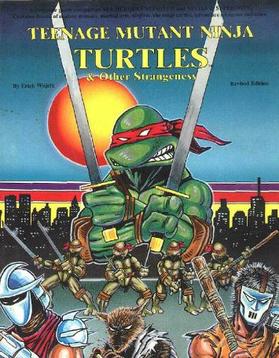
So that’s how I learned what a roleplaying game was, and learned to do that basically by abusing my little brother in the rules. And from there, it kind of branched out into other Palladium games and D&D and eventually a bunch of other things. Like Vampire, because it was the 90s. I was a queer kid.
DA:That’s a very different introduction from a lot of people, starting with specifically TMNT, but Palladium and those games, most people are like, “Oh yeah, I played D&D,” you know? You did, but that wasn’t your starting point.
CF: Yes, and it turns out most people are brought in by like a friend or a sibling or a cousin or something who already games, and shows them how to do it. And I kind of had to –
DA: Be your own friend.
CF: With a Palladium book, for gods’ sake. Be grateful I’m still here.
DA: Yes, it’s a testament to your fortitude on that, for sure.
CF: And yes, writing them just came a few years later, because I started writing my own game material for those games. It was the mid- to late 90s, so I made a website and put all of my stuff up there, and I was active in the Palladium forums. Eventually, they announced they were doing a fan magazine, and I submitted some stuff and they liked it and they published it. And that’s how I started writing the first time, and then kind of had a fallout, because Palladium doesn’t retain freelancers for long.
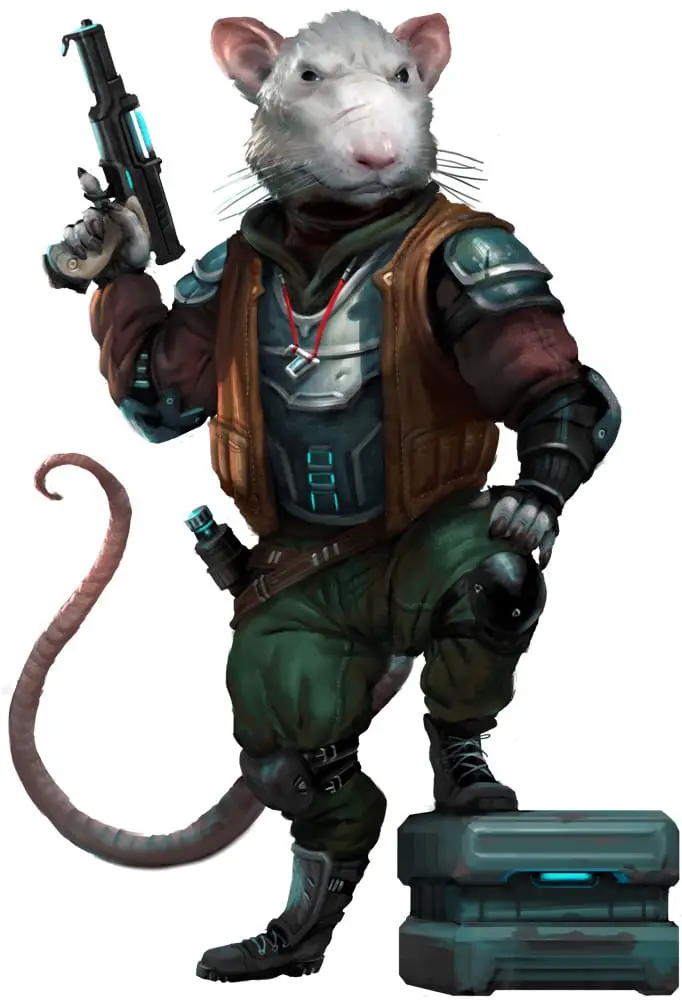
That kind of put me off working in the games industry, and I went off and led my life in other directions and still played. That’s how I met my wife, and eventually she got into this new company, called Paizo, and hauled me off to the very second PaizoCon. That was the first one Paizo itself ran. It wasn’t just a bunch of fans getting together like at a hotel. And ran into some of them, met some people.
Was trying to, at the time, figure out how to get into self-publishing my own stuff. I knew how to write. I was an illustrator at the time, I could edit. The only thing I didn’t know how to do was graphic design, so I asked about interning with their art department to learn some graphic design and that turned into a ten-year career at Paizo.
DA: And you wrapped up with them fairly recently, yeah?
CF: Yes, wrapped up July of 2018. I got to participate a lot in the Starfinder development process, and that was a lot of fun. The skittermanders are my babies.
DA: Oh, fantastic!
CF: And I contributed – I’m the one who said we need to put Ysoki in there, because we’ve already said they’re on Akiton and we need the halfling equivalent, like something small and something a little silly and something that PCs who play halflings and gnomes are going to gravitate towards. And at the time, they were like, “Well, we need Lashunta in there, because space elves and we need some kind of big, tough Klingon-style race.” And when I pointed out Ysoki, they were like, “Ohhh.” And we ended up doing straw polls for a bunch of the names to figure out what things were called. So a lot of the Solarian-flavored stuff, I came up with, and that’s a lot of fun.
DA: The Ysoki and the skittermander are really, really fun. I run a Ysoki in my game. You worked on Pathfinder as well, correct? And helped design some of the Iconics?
CF: I did the design for Shardra Gelt the Shaman and Lirianne the Gunslinger, and brainstormed with Wes Schneider for Enrika, the half-orc Inquisitor.
DA: Yes, and the Shaman was really one of the first major trans characters in any RPG, but especially in a major RPG, right?
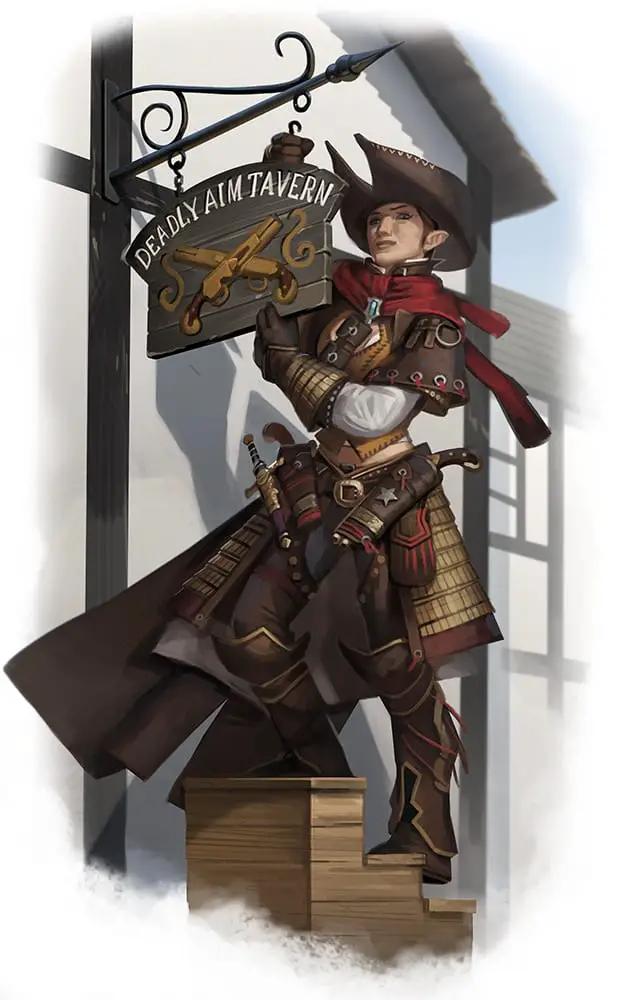
CF: Yes, I’m really proud of her, because I’ve been pushing for a long time that we needed a trans iconic, because at that point, we had a good 30 different Iconics. I’d been bugging the editors or upper management about it for a while, that we need some trans representation because we kind of hemmed and hawed about, “I guess most of our iconics are bisexual, but we’re not being overt about it.” Eventually, when we started doing the comics, we talked about how Marisiel and Kira the Cleric were in a relationship, which is adorable, if you read the comics.
But yes, nothing for trans people, and I kept pushing. When we ordered the art for the advanced class guide, I stormed into Wes Schneider’s office, my editor at the time. I said “I want one of these Iconics, I want to make them trans.” He’s like, “Well, we’re going to give you one of the iconics. We’ve got this half-elf, and they’re a swashbuckler and kind of androgynous and gish-y and we want you. Which iconic do you want?” I’m like, “I want the dwarf.” So there were two minutes of uncomfortable silence, and he said, “Okay.”
DA: So she’s not what people, I think, would pick. She’s revolutionary not just because she’s trans, but because of the way she’s presented as a trans person is very, very cool.
CF: Yes, I specifically wanted the dwarf, because dwarves are always the very traditionalist race in every fantasy world, and so I wanted not only for her to not just be an androgynous, scrawny, human-looking person, but I wanted to emphasize that trans people have roles in history.
DA: I definitely appreciate your advancing the queer agenda within gaming, so that’s fun. I appreciate that, some people might not.
CF: It’s why I came back to gaming. I’m like, “I can deal with this, so long as I have a pulpit from which I can push the queer agenda.”
DA:So you finished out with Paizo and you worked on Starfinder, you worked on Pathfinder, bits of Adventure Paths.
CF: Yes, I was running the Adventure Path line for a few years.
DA: Then you moved over to Green Ronin. Had you done some work with them before?
CF: I’d started freelancing with Green Ronin when they announced Blue Rose 2nd Ed. I’ve sent them an email, specifically saying, “Hey, I know you didn’t mean this, but in the first edition of Blue Rose, the utter lack of trans people except for this one ruling where you said body-altering magic is always corrupting, it comes across as saying trans people are evil. And I know it’s probably not intentional, but I’d love to give you some feedback and some insight.”
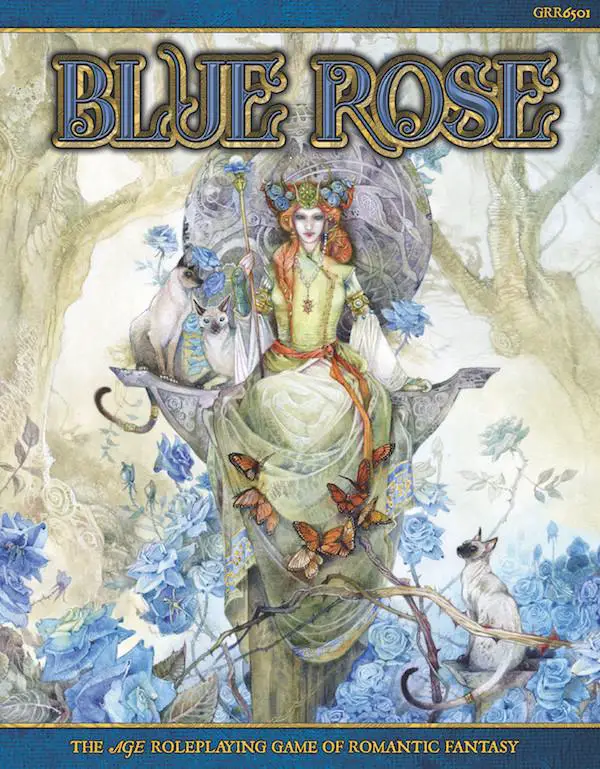
Within I’d say half an hour, [Chris] Pramas and Steve Henson wrote me back and were like, “Oh god, we never even saw that. We wouldn’t have even thought to look. Could you write the gender section for us?” And this was before or just after 5E came out, and everyone was giving them praise for giving two paragraphs on gender. And they gave me 2000 words to work with.
DA: Are you now with Green Ronin more full-time?
CF: Yes, about 20 hours a week, sometimes a little more if we’ve got a big project we’re putting together, sometimes a little less if things are quiet. And then I did freelance writing with a few other companies. I’m pushing to try and get my writing career into other genres, so I’m trying to do more fiction and doing some comic books. I’ve got a project I’m working on with Oni [Press] that I can’t talk about too much, besides saying that I’m working with Oni.
DA: I’ll be excited when that comes out, to find out more about that. So right now, I think your main focus is Mutants & Masterminds right now.
CF: Yes, I’m the line developer.
DA: So was that something that you asked to be in charge of, you asked about, or you were put there?
CF: It’s something I asked about. Fortunately, I just wanted to write for Mutants & Masterminds. Like I said, I got started on Heroes Unlimited. I was a big comics nerd. Mutants & Masterminds has been my favorite superhero RPG since 2005 or so. And when you work in the industry, if you don’t know somebody at a company, somebody you know does, and I mentioned this. And Owen Stevens overheard me, and without me knowing, turned to his computer and emailed Chris Pramas like, “Hey, this person would like to work on Mutants & Masterminds.”
DA: And so, what other books have you worked on within Mutants?
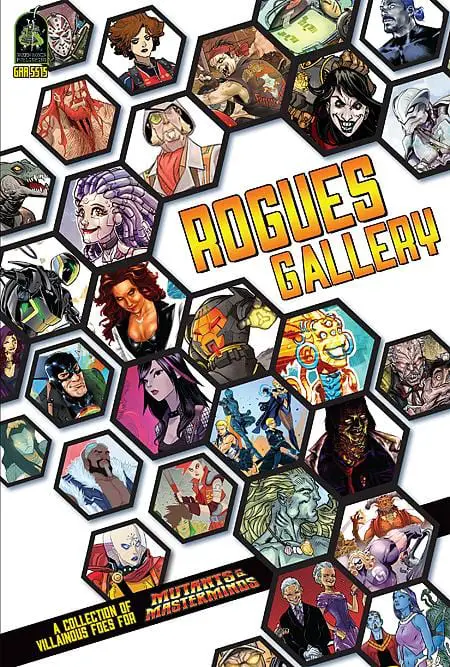
CF: My first was Rogues Gallery. That’s a big monster manual of supervillains. I came in – the previous developer was having a lot of trouble and had to basically step away to get real life problems sorted out, so I came in and a bunch of that book had already been done. I basically took the last ten percent to bed, and everything after that. So I’ve worked a lot on Freedom City. One of my conditions for coming to work for Green Ronin was, if I do, I have to be allowed to put a trans superhero on the Freedom League, which is basically our version of the Justice League.
DA: Very good.
CF: Yeah, not only did they say yes, but they’re like, “Why didn’t we already have that?”
DA: The response everyone should have. And then, you’ve worked, I believe, on two new books that just came out, or are coming out?
CF: Yes, two that came out this year. So, the Super Team Handbook, which is semi a players handbook and semi a big collection of sample campaigns you can run.
DA: So it’s like how to make your own league, right?
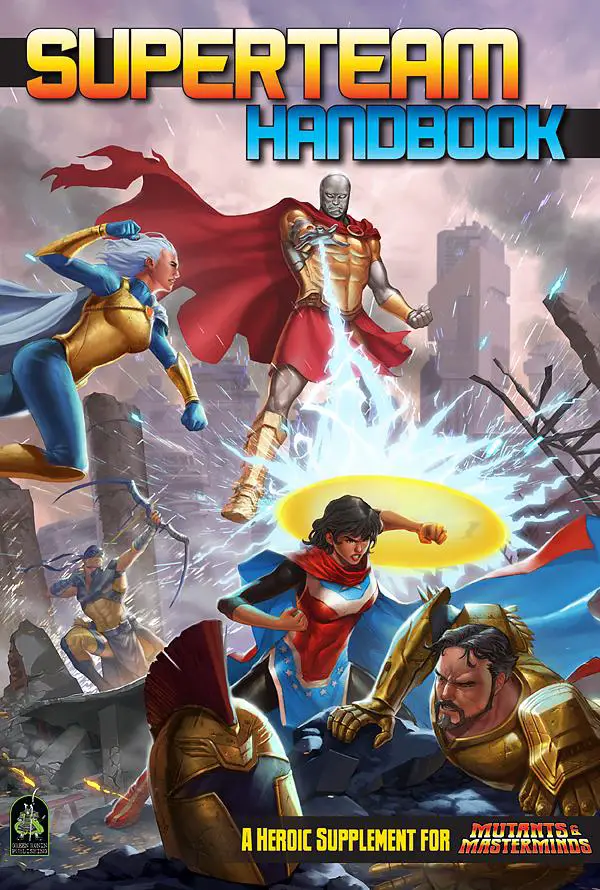
CF: Yes. It’s got a section on how you work well in a group, which is just a very general, not even limited to gaming, “Here’s how you give other people the chance to speak, here’s how to make yourself heard, here’s how you understand your needs and somebody else’s needs,” and it’s got chapters on building a character that has a definite place in a group setting, not just, “I’m making my character.”
DA: Yes, definitely people in any setting could probably read that, or should read that.
CF: I would hope so. It’s not a book I remember seeing for a lot of other systems. I hope people like it. It was the last thing on John Hauser’s list of books to make for third edition, before he left. He hadn’t had a chance to do any outlining or anything for it yet, but it was still something we pitched on the schedule. So that’s something we’re going to – or that was basically the last of John’s legacy, with M&M.
DA: Okay, and then what was the other one that came out, Super Teams and?
CF: The Deluxe Game Master’s Guide, which our first Game Master’s Guide is out of print, and we wanted to reprint it, but we wanted to at least take it to hardback, because it’s a core book that sees a lot of use. And while we were doing that anyway, I went back and added a chapter on adventure design and expanded the chapter on generic villains and minions and monsters and added a couple sample adventures. So it’s a lot more of a resource for GMs who are especially fairly new and want to pick this up and both make their own adventures but have some idea and template for what to run through.
DA: You mentioned the Oni Press that you can’t talk about. Is there anything you’re working on that you can talk about, that’s coming out?
CF: I’ve got – well, coming up for Mutants & Masterminds, it’s in production now. We’ve got the text turnovers, most of them, is the Time Travelers’ Codex, which time travel is such a big element in superhero comics. Every superhero travels through time at some point, and then your Legion of Superheroes, your Ninja Turtles, tons of other books, time travel is a major element, and I like time travel, personally. So my first book that I’ve taken from concept to hopefully finished soon is time travel.
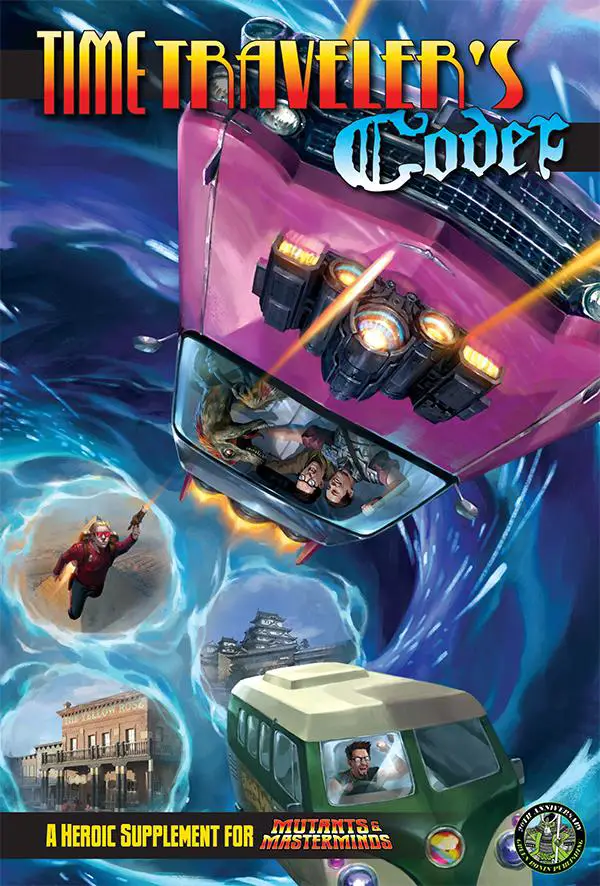
DA: Now, with time travel – and this might be a little bit nitty gritty, but I’m curious. Your Mutants & Masterminds, I know a lot of the Green Ronin books, and you’re very good at focusing on progressive, having a trans character. How do you handle time travel where they might be going to a setting where things are less diverse? Well, things are less accepting.
CF: We’ve got a whole section on that in the Game Mastering chapter, about how to deal with ugly history. It covers a lot of different things. Honestly, we could make a whole book about this. It breaks it down into basically, history isn’t necessarily a steady march of progress. Things in the past aren’t necessarily as awful as you think they are. Early in the 1920s, it was incredibly queer positive and accepting, and prior to I want to say 17th century, the idea of racism against Black people just wasn’t much of a thing in most of the white world. But there’s that, and there’s also – ultimately, it’s a thing you have to discuss with your players. So sit down, talk about do you want to highlight the ugly things about history so that you can overcome them and challenge them, or do you want to downplay those elements and just kind of not worry about them during your relaxation time? Because it’s going to be a different answer for every player and GM.
DA: Yeah, you might not want to go back to the AIDS crisis with your queer character. You might not want to go back to lynchings if you have a Black player or something.
CF: Yes, and again, it’s different for everybody. Like, you may have players who want that catharsis, who feel helpless in their real lives and want to go back and punch Klansmen.
DA: Yeah, and kick ass.
CF: Or go punch Klansmen now.
DA: Well, they should be doing that anyway.
CF: I’m glad we’re on the same page.
DA: There we go. That should be just a new thing for the modern age, punching Klansmen in the book. The whole book is about punching Nazis.
CF: Fun fact, that’s the next book.
DA: Oh, hell yeah.
CF: That’s the Vigilantes Handbook.
DA: Oh, fantastic.
CF: Which is still in the outline stage. But it’s going to be street level superheroes, your Daredevil, your Ninja Turtles, your Defenders.
DA: The best ones, other than the Batman.
CF: Some people think so. It’s going to be lower end of the power scale and a lot more asking personal questions and there’s going to be a fairly large section about what defines the themes of vigilante games and what does justice mean versus what does justice mean on a societal level versus on a personal level, and that dichotomy. Like, those things opposing each other for a lot of vigilante hero characters.
DA: Anything else?
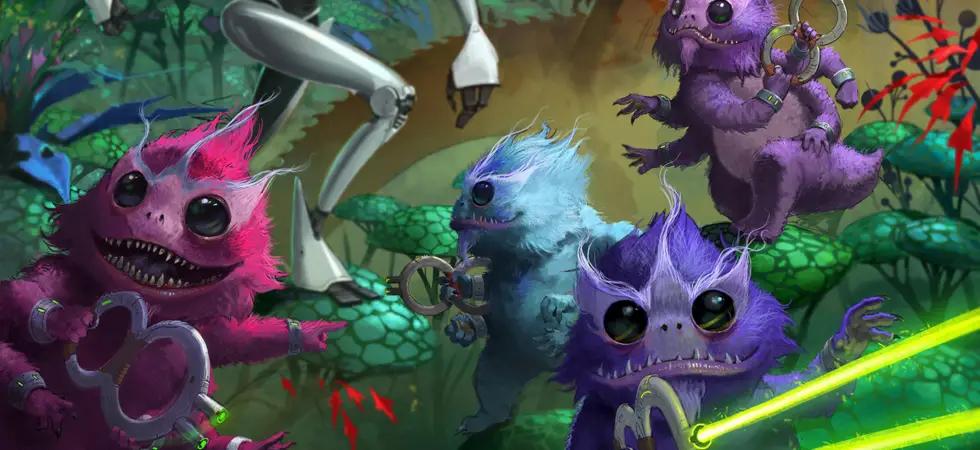
CF: Yes, and then doing more Starfinder writing, so I did the Alien Archive 3 is coming out in a couple months, and I get to work on that, including a Skittermander Predator. It’s an evolutionary offshoot. So basically, it was an asteroid impact on their home world, like 30,000 years ago, and their species diverged with skittermanders basically still living on the surface and having to learn better cooperation techniques to survive, and others retreating into this labyrinthine cavern complex below the continents, and becoming more predatory. It’s basically the morlock-eloi division.
DA: And then, I guess outside of games that you’ve written or worked on, are there any games that you’re really into? I don’t know if you have time to play games as much, but games that you’ve really been impressed by or just that you really like, or that kind of thing?
CF: I don’t have as much time to play games as I really, really want to. But like everybody else on the planet, we had a D&D 5th Edition game going for a while, that kind of fell apart because one of our players moved away.
DA: Always happens.
CF: So I was having a lot of fun with that. I like a lot of the design decisions they made. I like how quick and easy it is to pick up and teach new players, and I like that there’s so much focus on you describing what your characters like, instead of being defined by your class features.
DA: So one thing I want to ask, since you’ve been within the industry for a long time, in one form or another, there’s been a big hullabaloo within people outside the industry or within the industry about how much more accepting and queer and of color the gaming industry is now. Do you think there’s been a sizeable shift since you’ve been in it, when it comes to especially people who are more within your identities as a woman, as a trans woman?
CF: In a lot of ways, it has definitely gotten better. But I don’t think, as a portion or a percentage of the population, we’re necessarily that much more numerous now. I think we’ve stopped hiding. I mean, in my local game groups, there’s always been a ton of women. There’s always been people of color and queer people, but a lot of us didn’t feel comfortable going to cons, and if we did, we really tried to shrink into the background. So, I think people are comfortable being forward and out about it, and I hope that stays. But I’m kind of worried. In our current political climate, people are getting a lot less tolerant and it’s going to become a lot more dangerous to be overt with your identity. I’m not proud of it, but I went stealth for a long time after I transitioned, until it kind of dawned on me that not being out doesn’t help anyone but me, and that most of why I had such a difficult time in high school and college was because I didn’t have any community. I didn’t have anybody to look up to. I didn’t have resources I could find to make it just a little easier and not feel as alone. That’s why I ended up coming out when I was working for Paizo. I was so visible at that point that I didn’t want to waste that visibility not helping people.
DA: Yes, and you’ve definitely been. I know people who have really gotten a kick out of your twitter threads on the subject.
CF: The one everybody remembers is I did a very long Q&A session about my vagina.
DA: I think that was one I definitely sent, because it was very funny in some places.
CF: I like to say I have the most famous vagina in gaming.
You can pick up the Time Traveller’s Codex here, and check out all of Green Ronin’s releases on their website or at their shop.
Images via Paizo Publishing and Green Ronin Publishing
Have strong thoughts about this piece you need to share? Or maybe there’s something else on your mind you’re wanting to talk about with fellow Fandomentals? Head on over to our Community server to join in the conversation!

